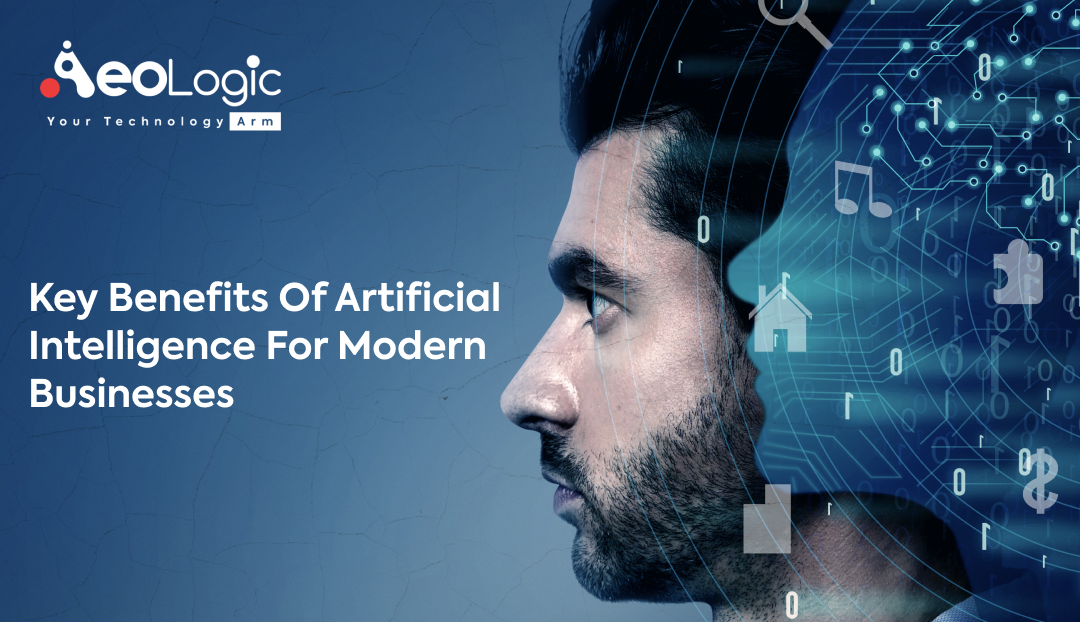Introduction
As associations increase their benefits of artificial intelligence technologies within their operations, they are reaping palpable benefits that are anticipated to deliver significant financial value. In today’s fast-paced, technology-driven world, the business terrain is witnessing a profound transformation, and the enabler of this revolution is Artificial Intelligence (AI). As we navigate the complications of the 21st century, AI has surfaced as a driving force for invention, effectiveness, and growth across sectors. From automating routine tasks to enhancing the client experience, AI’s impact on ultramodern businesses is inarguable. In this composition, we explore the crucial benefits of Artificial Intelligence brings to the table, slipping light on how it’s reshaping strategies, operations, and eventually the future of businesses worldwide.
Also read: Transforming Businesses with AI Automation Solutions
What’s Artificial Intelligence?
Ever since tools like ChatGPT and Midjourney made captions around the world, we have all come each too familiar with the benefits of artificial intelligence and machine learning. But for a quick recap, let’s answer the question of what AI really is. Artificial intelligence (AI) refers to the development of computer systems that can perform tasks that generally bear human intelligence. These tasks include understanding natural language, identifying patterns, working complex problems, and making opinions. AI systems are designed to dissect data, learn from it, and acclimatize their experience consequently.
What are the Benefits of Artificial Intelligence?
As we enter the AI age, artificial intelligence (AI) is getting a game- changer across multiple sectors, offering a wealth of benefits that streamline operations and drive growth. Following are seven crucial benefits of artificial intelligence that can bring results to ultramodern businesses
Reducing Human Error
First and foremost, AI excels at reducing numerous of the crimes that an average human being can make – a critical factor in data-driven decision-making. By automating complex computations and data analysis, AI greatly reduces the threat of manual faults and ensures more accurate perceptivity and issues.
Minimizing Costs
Maybe indeed more importantly than reducing faults, AI can greatly drop operating costs. By automating tasks that would else bear expansive human labor, businesses can significantly reduce their expenditures. This is especially prominent in sectors where there are numerous routine tasks that can be effectively handled by AI systems, similar as finance and e-commerce, freeing up human resources for further strategic decision-making places.
Automating Repetitious Tasks
Just as we mentioned in the former post, AI excels at automating tedious tasks, which will be the first to go as artificial intelligence technology advances. This shift will enable workers to concentrate on creative and strategic enterprise that foster business invention rather of squandering time on fairly insignificant tasks in the grand scheme of effects.
Enabling Rapid Decision-Making
AI processes large quantities of data in real-time, allowing businesses to make prompt, informed opinions. This speed is pivotal in today’s fleetly changing business terrain. 24/7 Availability
Unlike humans, AI systems don’t bear rest, making sure of nonstop operations and client service. This 24/7 availability and accessibility enhances client satisfaction and responsiveness. Which is essential segments of modern business success.
Risk Mitigation
Every business brings with it a unique set of organizational pitfalls. By assaying literal data and patterns, AI can identify these potential pitfalls and anomalies that may go unnoticed by humans. This visionary approach enables businesses to take precautionary measures and minimize capable dislocations.
Improving Processes and Workflows
Last but not least, benefits of artificial intelligence can optimize functional effectiveness by relating bottleneck areas, suggesting advancements, and fine- tuning processes over time.
This results in smoother operations, reduced inefficiencies, and overall enhanced productivity.
What are the Disadvantages of Artificial Intelligence?
Of course, not everything is straightforward, and indeed the most advanced technologies may cause some problems along the way. Following are five typical challenges that modern businesses need to be conservative of when exercising AI- grounded results
Costs of Development
Artificial intelligence and machine learning results are gaining wider acceptance across several business sectors. As a result, creating enterprise software grounded on AI requires largely professed programmers, which frequently results in increased development costs. It’s pivotal to have acceptable proficiency and knowledge when developing AI- grounded results. Companies seeking to apply AI and ML results in their regular operations should consider seeking help from custom software development companies that specialize in developing AI- grounded software products. Reliance and loss of control
As companies decreasingly calculate on AI for essential functions, there’s a threat of over-dependence. Dependence on AI systems without a clear understanding of their inner workings or the capability to troubleshoot them manually can affect invulnerabilities. However, companies may face difficulty performing duly, which can affect in financial losses, If AI systems fail or bear suddenly.
Data Privacy and Security
The use of AI constantly involves gathering and assaying vast quantities of sensitive data, which presents a substantial threat to data privacy and security.
Difficulties in Enforcing Ethics
Integrating ethical considerations into AI systems can be complex, as machines don’t have moral judgment and can unintentionally perpetuate biases present in data. Hence, making sure of fair and unprejudiced issues requires scrupulous programming and nonstop monitoring.
Lack of Creativity
While AI excels in tasks driven by data and sense, it may struggle with creative tasks that bear suspicion, imagination, and human emotion. The implicit lack of creative thinking could position certain aspects of business invention and problem- working.
Also read: The Importance of Artificial Intelligence in Everyday Life
Conclusion
In embracing the benefits of Artificial Intelligence, modern businesses aren’t only optimizing their present operations. But also laying the foundation for the progress of future generations. The benefits of artificial intelligence are multifaceted, touching every aspect of operations, from streamlining processes to customizing client relations. As businesses continue to harness the power of AI, they place themselves not just for success. But for a future where rigidity and imagination are crucial. Embracing AI is not simply a choice. But a necessity to thrive in the ever- evolving geography of today’s business world.
Connect with us to know more about integrating artificial intelligence into your business!






